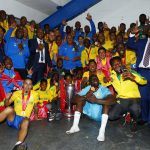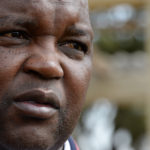Freddy Zungu, the fabric of Sundowns for decades
The Mamelodi Sundowns kit manager has seen it all at the club he has called home since 1990 and is perfectly placed to speak about the revolution the Brazilians have undergone.
Author:
27 February 2020

The letters F and Z sit quietly and proudly on the chest of Mamelodi Sundowns kit manager Freddy Zungu. It’s probably a good thing they are on that side of his shirt, because if they sat over his heart they’d be at risk of bouncing off. On match days his heart, which pumps the club’s canary yellow and blue through his veins, beats faster than a Formula 1 car because he isn’t just at work, he is also watching his favourite team.
The 56-year-old stares at those letters lovingly before emitting his booming laugh. They aren’t just any letters, they are his, representing his name and surname. He has placed many such letters on to shirts for the club’s technical team, along with seeing to the printing of the names and numbers of Sundowns’ players on the backs of their shirts.
But this routine he has done a million times felt different when it was his initials. “I was very happy,” Zungu says as he takes a trip down memory lane. His body is in the Sundowns’ dining area of the club’s base in Chloorkop, but his mind has jogged back to the day he got the T-shirt featuring his initials.
Related article:
“It brought a lot of pride because now people saw and appreciated what I did. I wore it even when I was going to functions, outside of football matches, because people had to see it. They saw that this person is doing something here. I asked some coaches before [to put my initials on my kit] and they didn’t like it. When I raised it, they didn’t approve it. I had always wanted it, but they said no. It was only when we were sponsored by Adidas that Ted Dumitru said do it when we were printing new jerseys. I worked well with that old man, may his soul rest in peace.”
Through ups and downs
Zungu has seen it all at Sundowns, from the glorious days of Dumitru, who had arguably the greatest team in the Premier Soccer League era, to the lean years during which Patrice Motsepe saw little return on his investment and then continental supremacy under coach Pitso Mosimane. Zungu becomes animated when asked who is the best player he has seen at Sundowns since arriving as a volunteer in 1990, before he was given a permanent contract on 12 February 1991.
“Roger [Feutmba] is by far the best,” Zungu says, but he doesn’t stop there. “And then there is Mambush [Daniel Mudau], Fire [Joel Masilela], Jazzy Queen [Harold Legodi], Rabie Moripe, Go Mabusela, William Zondi, [Andries] ‘Panyaza’ Chitja, [Jan] ‘Malombo’ Lechaba, Isaac Shai, Lovers Mohlala, Themba Mnguni, Bennett Mnguni… There was another defender that I loved very much, Thomas Liboh, who was from Cameroon. He arrived the same time as Roger. There isn’t a defender that was like him, the closest is [Mbulelo] Mabizela. We have had many great players don this jersey.”
Zungu emphasises the word jersey because that’s his responsibility. He works seven days a week and arrives 30 minutes before the players and the technical team arrive to ensure that all the kit they will need for the day is ready. That’s the easy part of his job. Ensuring that the kit arrives intact for their away matches is where he earns his salary.

That job is even more complicated at Sundowns, with a team that has travelled the length and breadth of the continent in their CAF Champions League sojourns. Zungu takes no chances, what with some airport staff being so friendly as to unpack people’s bags and then hang on to their possessions so they aren’t weighed down by heavy loads on their travels.
“The suitcases that we travel with are aluminium and they have many locks,” Zungu says proudly. “We use locks and LL keys. You will never open it. Even if you break the locks, you wouldn’t be able to open it. I make sure when it comes to my things. I lock them up and also wrap the kit. I make sure that they don’t steal anything, including the balls, especially when we travel on the continent in North Africa.
Related article:
“We make sure that the balls are in the trunk because they also steal them. If you aren’t careful, you will get there with three balls. Who will you ask? They will tell you to lodge a complaint and then follow the process, but you have a game soon and no time for that. And some teams aren’t friendly, they will tell you to go buy the balls at the shop. So I have to make sure that we arrive with everything that we left with.”
Zungu has a foolproof strategy for away games, which includes travelling with the kit of every registered player (to accomodate any late changes) and taking both home and away jerseys. His thinking was vindicated in Tanzania, when a trunk containing one set of jerseys went missing at the airport.
In familiar surroundings
There were no such problems when Sundowns arrived in Cairo, Egypt, on Tuesday 25 February for the first leg of their CAF Champions League quarterfinal clash with Al-Ahly on Saturday 29 February at Cairo International Stadium. The second leg will be played at Lucas Moripe Stadium in Atteridgeville, Pretoria, on 7 March. The two clubs met at this stage last year as well. Sundowns wiped the floor with Al Ahly in the first leg, beating them 5-0 in Atteridgeville before wrapping up the tie in Alexandria to advance to the semifinals.
For Zungu, that drubbing was sweet revenge. The pain of losing the final of the 2001 Champions League to the Confederation of African Football’s Club of the Century was still fresh, 18 years later. Zungu whistles before talking about that final.
“The first leg ended 1-1 and they won 3-0 in Egypt,” Zungu says solemnly, the funny and carefree man replaced by a man who looks his age.

“The referee robbed us. I am not a violent person, but that day I ended up holding the referee by his trousers. We were fighting. The police had to intervene. If it wasn’t for them, I probably would be in jail. Our coach also disappeared there. For almost six hours we didn’t know where he was. He disappeared the night before the game. We only saw him in the morning. The management asked him where he was, I didn’t follow it up. I have taught myself one thing, to mind my own business.”
A lot has changed since that final, and Zungu had a first-class seat to that revolution. Sundowns went on to win the Champions League in 2016, coincidentally in Egypt. They beat Al Ahly’s rivals, Zamalek, 3-0 in the first leg in Atteridgeville before wrapping up the tie in Alexandria to win the contest 3-1 on aggregate.
“I had been waiting for this trophy for a long time because I had the silver medal from the final against Al Ahly,” Zungu says, his signature smile returning. “I didn’t sleep that night. I went to the hotel’s reception and just watched people as they came and went. I was so happy that I finally found the only medal that I didn’t have and had been looking for. In the morning, I told the coach [Mosimane], ‘Thank you, thank you very much.’ He didn’t know what I was talking about. He didn’t ask me. Winning the [CAF] Super Cup was very important for us. I am very grateful for those medals.”
Zungu has more gold medals than some mines have gold. He was there for all of Sundowns’ nine league titles in the PSL-era. Dumitru was responsible for the first three, Mosimane led the club to the last four. These two are the coaches Zungu praises most from his time at the club.
Related article:
“Most people don’t understand Pitso, but us who are close to him understand what type of person he is … He teaches us a lot of things because he has been abroad. He comes from a very strict country. Greeks fight with you now and then turn around and buy you tea. His system is similar to how they do things in Greece. He even speaks their language. I have learned a lot from him.
“He teaches us a lot of things. He has a good heart. If there is something that we have done wrong, he tells us. He doesn’t beat about the bush, he tells us straight. I like how he does things because when you work with people, once you’re soft, things will not go well. They then get into your pocket and take you for granted. Be hard and fair. I respect him. I just hope that the owner of the team also respects him because to have a coach who collects so many trophies for you, in the timeframe he has done it on, it’s not easy.”

Surviving in Johannesburg
The glory that Sundowns gave him is more than what Zungu was looking for when he left Ga-Machacha, his birthplace in Limpopo, for Roodepoort in 1984 in search of a job. He was forced to start working after his father died and he dropped out of school in grade 8.
“I did anything that required labour when I arrived in Johannesburg,” Zungu said. “If they said there is a job that involved mud, I was there. I did anything that gave me money. I am not a lazy person. I have hands. I can do roofing, including putting on the ceiling. I have certificates for that. I can also do carpentry. I also did panel-beating, but I only did basic level of that. You know when you are stranded, you learn anything that will get you a job quickly.
“It’s important to know what you want in life. My dream was to be a lawyer. But things didn’t work out the way that I wanted them. However, I am content with how my life panned out though. My children are old. I am happy with them. I think that it’s okay.”

You don’t have to ask Zungu if he loves Sundowns. It’s evident in the way he talks about the club, his welcoming air as he strutted around Chloorkop in search of a quiet place to chat and in his broad smile when he opened the store: “Welcome to my office,” he said excitedly.
Inasmuch as he loves Sundowns though, the club wasn’t his first love. Witbank Black Aces was. He only switched allegiance from Aces to Sundowns when Legodi and Harris Chueu became Brazilians. His idols then became his colleagues and Zungu became more than a Brazilian, he transformed into the fabric of the club. You might not see him when Sundowns is in action, but you do see his work.
“You learn every day, even now I can’t say that I know everything about this job. I still want to learn.”




